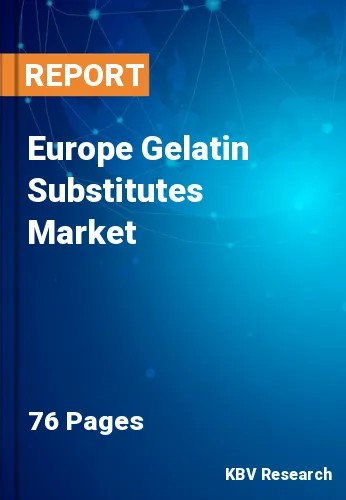The Europe Gelatin Substitutes Market would witness market growth of 6.1% CAGR during the forecast period (2022-2028).
Pectin is used in medicine to thicken and increase the volume of stools, which helps treat constipation and diarrhea. Until 2002, pectin and kaolinite were two of the critical components of the diarrhea treatment medication Kaopectate. Pectin has also been applied to remove heavy metals from biological systems.
Additionally, pectin serves as a demulcent in throat lozenges. It is also used as a prominent stabilizer in cosmetic goods, colostomy devices, specialty medical adhesives, and preparations for wound healing. The galactomannan polysaccharide known as guar gum, also known as guaran, is obtained from guar beans and possesses thickening and stabilizing qualities that are helpful in feed, food, and various industrial applications.
Guar gum is used as a thickening ingredient in both human and animal food and medication. It is used as an addition to switching out wheat flour in baked items because it is gluten-free. It has been demonstrated to lower blood sugar levels and serum cholesterol. Guar gum is also cost-effective because only a tiny amount is required to produce a sufficient viscosity. It has a water-thickening capacity that is almost eight times more than other agents (such as cornflour). Therefore, most manufacturers utilize guar gum in production processes as it offers a cost-effective solution.
In the UK, gelatin substitutes are frequently used to create low-calorie sweets and pieces of bread without starch. Gelatin substitutes are gaining popularity because they are a non-nutritive bulking agent with less than 0.2% fat, wash out harmful residues, and reduce cholesterol absorption. As per the E-406 regulation of the European Community, agar is regarded as the healthiest hydrocolloid on the market and is a permitted ingredient. For better gelling results than gelatin, it can be used in place of or in addition to pectin in jams and marmalades. It can also be used as a strengthening agent in custards and souffles. Agar-agar is also used in the traditional Russian dessert ptich'ye moloko (or bird's milk), which is a decadent jellified custard used as a filling for cakes as individual desserts with chocolate frosting. The gelatin substitutes market has also grown as a result of rising chocolate consumption among teenagers in this country and increased consumer understanding of baking components.
The Germany market dominated the Europe Gelatin Substitutes Market by Country in 2021, and would continue to be a dominant market till 2028; thereby, achieving a market value of $217.8 Million by 2028. The UK market is anticipated to grow at a CAGR of 5.3% during (2022 - 2028). Additionally, The France market would exhibit a CAGR of 6.9% during (2022 - 2028).
Based on Product, the market is segmented into Agar-Agar, Carrageenan, Guar Gum, Xanthan Gum, Pectin, Cornstarch, and Others. Based on Application, the market is segmented into Food & Beverage, Pharmaceutical & Nutraceutical, Personal Care & Cosmetics, and Others. Based on Function, the market is segmented into Thickening & Gelling, Stabilizing, Emulsifying, Binding, and Others. Based on countries, the market is segmented into Germany, UK, France, Russia, Spain, Italy, and Rest of Europe.
Free Valuable Insights: The Global Gelatin Substitutes Market will Hit $3.2 Billion by 2028, at a CAGR of 6.3%
The market research report covers the analysis of key stake holders of the market. Key companies profiled in the report include NOW Foods, Inc., Cargill, Incorporated, Gelita AG, B&V S.r.l, Agarmex, S.A. DE C.V., Java Biocolloid (Hakiki Group), Great American Spice Company, Special Ingredients Ltd, Brova Limited, and A.F. Suter and Co. Ltd.
By Product
By Application
By Function
By Country
Our team of dedicated experts can provide you with attractive expansion opportunities for your business.

